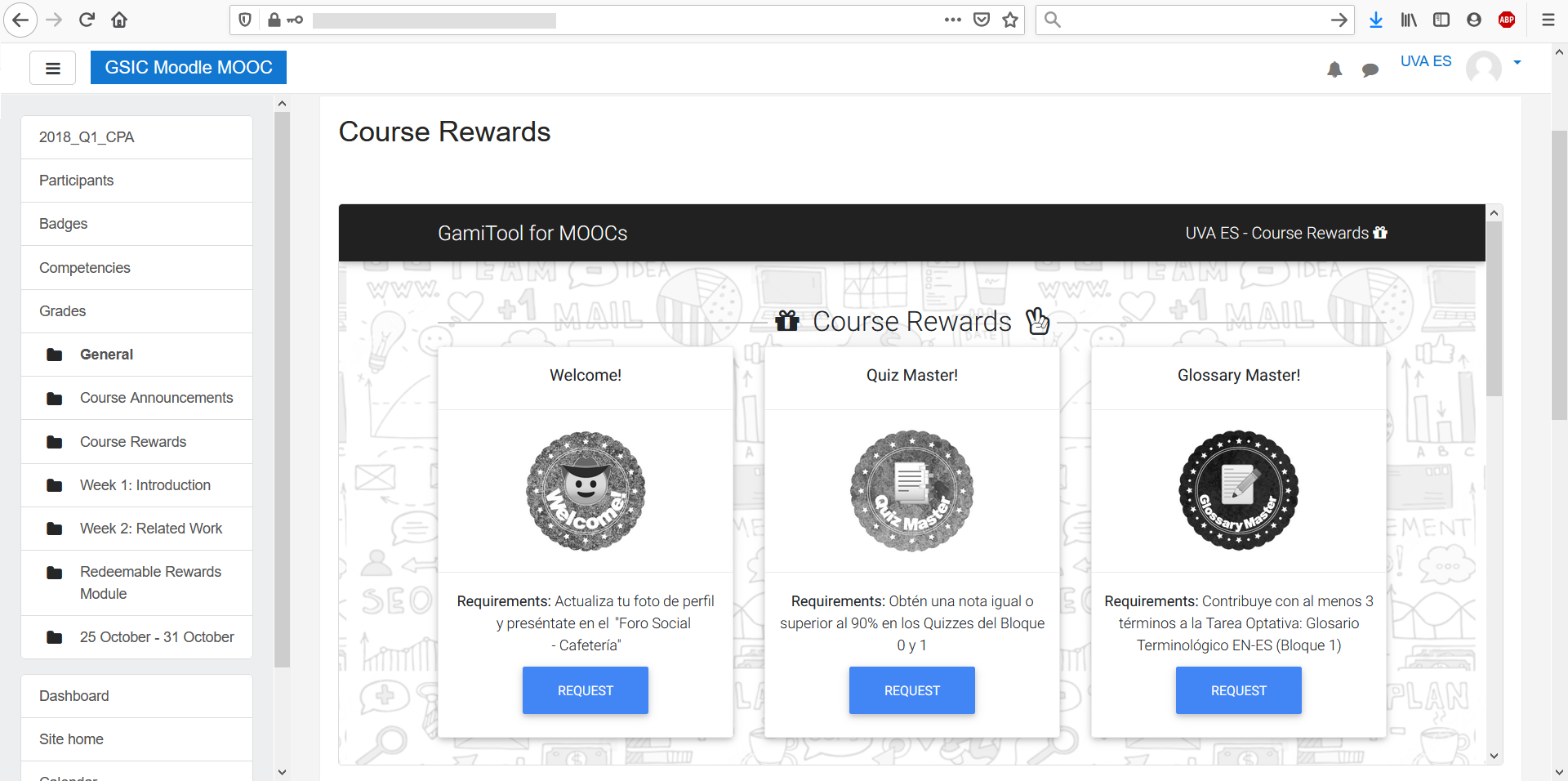About
GamiTool is a web-based gamification system that allows practitioners (i.e., teachers, instructors, instructional designers) to create computer-interpretable gamification designs, and semi-automatically deploy and enact them in multiple learning management systems and MOOC platforms. GamiTool has been developed considering a set of requirements associated to the provision of a wide design expressiveness, and to support practitioners' affordability and positive learners' experiences. To this end, GamiTool is mainly formed by two important elements:
- GamiTool-DM: an extensive data model that allows the configuration of complex reward-based strategies, including traditional (e.g., points, badges) and redeemable rewards (e.g., extend deadline submissions, get more time to complete quizzes).
- GamiTool-ARCH: a two-layer architecture implementing loosely-decoupled adapters, enabling its integration with multiple learning management systems, MOOC platforms, and external tools through pre-established contracts.
Configurable Conditions
Different Course Privileges
Practitioners already tested the tool
Publications
The following publications describe the components forming GamiTool, the evaluations carried out with GamiTool, and real experiences where GamiTool was used to support the orchestration of reward-based strategies in educational environments.
GamiTool: Supporting Instructors in the Gamification of MOOCs
2022
Ortega-Arranz, A., Asensio-Pérez, J.I., Martínez-Monés, A., Bote-Lorenzo, M.L., Ortega-Arranz, H. & Kalz, M. (2022). GamiTool: Supporting Instructors in the Gamification of MOOCs. IEEE Access, 10.
GamiTool: Towards Actionable Learning Analytics Using Gamification
2021
Ortega-Arranz, A., Martínez-Monés, A., Asensio-Pérez, J.I. & Bote-Lorenzo, M.L. (2021). GamiTool: Towards Actionable Learning Analytics Using Gamification. In Companion Proceedings of the 11th Learning and Knowledge Conference (pp.215-223).
To reward and beyond: Analyzing the effect of reward-based strategies in a MOOC
2019
Ortega-Arranz, A., Bote-Lorenzo, M.L., Asensio-Pérez, J.I., Martínez-Monés, A., Gómez-Sánchez, E. & Dimitriadis, Y. (2019). To reward and beyond: Analyzing the effect of reward-based strategies in a MOOC. Computers & Education, 142, 103639.
Creating Engaging Experiences in MOOCs through In-Course Redeemable Rewards
2018
Ortega-Arranz, A., Kalz, M., & Martínez-Monés, A. (2018). Creating engaging experiences in MOOCs through in-course redeemable rewards. In Proceedings of the 2018 IEEE Global Engineering Education Conference (pp. 1875-1882). IEEE.
Source Files
GamiTool source files are available under request. If you are either a practitioner (e.g., teacher, instructional designer) that wants to apply gamification in your courses, or a researcher that wants to use GamiTool within your investigation, do not hesitate to contact us. We will be happy to help with the setting up and enactment. Fill in the following form and we will get to you as soon as possible:
Acknowledgements
GamiTool is a research effort of the GSIC/EMIC research group, including all the authors of the previous publications. The research and development of GamiTool has been partially funded by the European Regional Development Fund and the National Research Agency of the Spanish Ministry of Science, Innovations and Universities under project grants TIN2014-53199-C3-2-R and TIN2017-85179-C3-2-R; the European Regional Development Fund and the Regional Ministry of Education of Castilla y Léon under project grant VA257P18; and, the European Commission under project grant 588438-EPP-1-2017-1-EL-EPPKA2-KA.
Contact
For further information, do not hesitate to contact us.
Location:
GSIC/EMIC research group
E.T.S. Ingenieros de Telecomunicación
Paseo de Belén, 15 (Room 2L019)
47011 Valladolid, Spain













